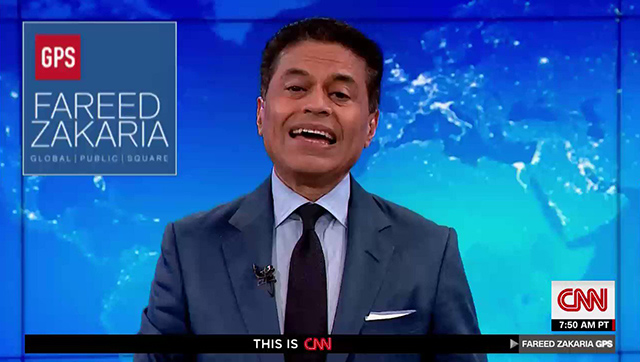CNN’s Fareed Zakaria visited India recently. In his op-ed in The Washington Post, published on 28 April 2023, and on his CNN show aired subsequently, Zakaria gets most things about contemporary India right. But he gets several wrong. And there’s much he misses completely.
He begins brightly: “Visiting India this week, I was struck by how different the mood there is compared with much of the rest of the world. While people in the United States and Europe are worried about inflation and a possible recession, Indians are excited about the future.”
India, writes Zakaria, is now the world’s most populous country and is “projected to be the fastest growing large economy as well.” So far so good.
But Zakaria has long been an India-sceptic. Some of his previous broadcasts on CNN would embarrass him today. On 2 April 2012, for example, Zakaria speaking to The Indian Express declared: “Narendra Modi’s downfall is imminent.”
Modi was then Gujarat chief minister. Zakaria’s exact words: “My personal opinion is that Narendra Modi is unlikely to be a national leader in India. I think he might not even be a regional leader in India.”
This was in 2012 when the Congress-led UPA II government faced multiple corruption charges. The economy had tanked, inflation was soaring. There was policy paralysis. And yet Zakaria said, dismissively, that Modi would never be a regional leader, much less a national leader.
Quick Reads
View AllTwo years later, Modi was elected prime minister.
Let’s get back to Zakaria’s current Washington Post op-ed. A considerably mellowed Zakaria now lists three “revolutions” that make him “bullish” about India.
The first revolution is Aadhaar. Zakaria quotes Nobel laureate Paul Romer who called Aadhaar “the most sophisticated ID program in the world”.
The second revolution, says Zakaria, is Mukesh Ambani’s Jio which has put a smartphone in the hands of over 700 million Indians. “In 2015,” writes Zakaria, “India was ranked 122nd for per capita mobile data consumption. Last year, it was first, exceeding the consumption of China and the United States combined.”
The third transformation, says Zakaria, is the “infrastructure revolution which is readily apparent to anyone visiting India".
But Zakaria is silent on the other “revolutions”, to use his hyperbolic term, that are as transformative. There’s not even a passing word on India’s Unified Payments Interface (UPI), possibly the world’s most advanced financial payments system which several other countries are now tying up with for instant transactions. (Aadhaar was conceived during UPA II by Nandan Nilekani, though fully executed by the Modi government. That could be why Zakaria’s memory captures Aadhaar but misses the revolutionary UPI, now with a global footprint.)
While labouring the well-worn point that India’s economy is still one-fifth China’s, Zakaria misses the more contemporary point that India overtook Britain last year to become the world’s fifth largest economy and is set to surpass Germany and Japan by 2026 as the world’s third largest economy behind the US and China.
Nor is there a word in the Post op-ed on India emerging as the world’s third largest startup hub with a burgeoning space programme.
All this positivity is enough to put off most commentators of a certain bent of mind. But Zakaria saves his best for last.
Out comes the inevitable trope of “inclusivity”. Writes Zakaria: “A focus on inclusivity would also ease India’s religious tensions, bringing into the fold the nation’s Muslims who face persistent persecution.”
But do they? Persistent persecution? That is being lazy with the truth. Indian Muslims have long enjoyed privileged status in India. During the Mughal Empire they were rulers. During the British Empire, they were co-opted as a martial race, much admired by the Anglo-Saxon British, themselves a martial race.
After Independence, Muslims continued to receive special treatment. Their personal laws were left untouched even while Hindu personal laws were codified.
Under the Modi government Indian Muslims are treated like any other citizen. Communal riots since 2014 have been rare. In the past they were endemic. Sharia law remains in force.
But Muslim-first secularism — which of course is not secularism at all but a disguised form of religion-based favouritism — is being phased out in India. Secularism demands a level-playing field for all citizens. That is the true inclusivity Zakaria fails to spot.
The India of that era is long gone. What should have impressed Fareed Zakaria on his trip to India finally sinks in.
He concludes his Post oped with this: “India has the potential to be admired for not just the quantity of its growth but also the quality of its values. And that would truly be an incredible India.”
What values is Zakaria referring to? Muslim inclusivity, of course. The parameter for judging a country’s inclusivity is how its smallest minorities — Parsis, Jews, Buddhists, Jains and others — are treated. Many face horrific persecution in illiberal Islamist countries.
For someone who told The Indian Express in April 2012 that Modi would never be a national or even a regional leader, the scales of prejudice have started falling off.
The writer is an editor, author and publisher. Views expressed are personal.
Read all the Latest News , Trending News , Cricket News, Bollywood News ,
India News and Entertainment News here. Follow us on Facebook , Twitter and Instagram .
)